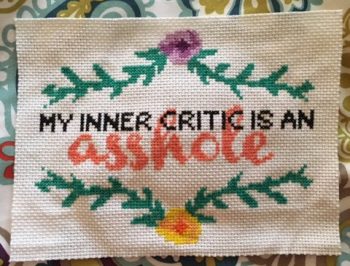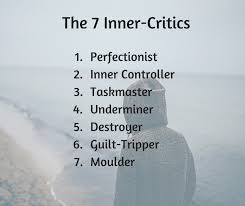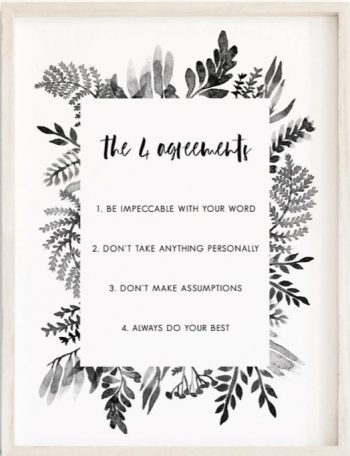Have your ever noticed what you say to yourself after doing something wrong? Is it mean or extra critical? Is it offering advice without you asking for it? I don’t know anyone who doesn’t have an inner critic at times. There are definitely ways to put the voice to rest, or at least have a more balanced conversation with it. Hare some some tips that work for me. And yes, i am my own client!
As much as i know that my inner critic is trying to help me, i also have learned that i can choose not to listen to you, and even tell it to go away. Just like learning any new language, being able to talk BACK to your inner critic takes practice. Here are some tips that can help you be fluent in this process.
1) Somatic Sense of Inner Critic
First, it’s important to recognize what your inner critic voice is. What do they say? What is their voice like? Do they blame your or push you down? How do they undermine you.
When your inner critic shows up, see where they live in your body – is it a loud dull pain in your chest, or a sharp scratch on your shoulders. A tool that can help is PATH – notice the pressure, air, tension, heat that may rise in your body. Where is it located? Spend some time noticing this. This mindfulness is a great tool to help you notice your inner critic more quickly. If you can locate the felt sense in your body, you can tend to it more quickly.
You can also do the great tool by Tara Brach called RAIN – recognize what is going on in the given moment allow the experience to be there, investigate with kindness and be open to Nurturing the new awareness with self-compassion. Click here for a lovely guided meditation that Tara has created using this tool.
Be really clear about when the inner critic shows up. They are not your only voice so notice if there is a pattern or consistency when they come up. Notice what your physical reaction is – is there a knot in your stomach, does our throat feel tight, is there a heaviness in your legs? This is the inner critic speaking.

2) Name them
I call mine Pam. She was someone that bullied me when i was in grade 6. I also love these meme: “My inner critic is An Asshole” and find it inspiring.
Acknowledge it is here, but like a vampire, you can tell it to leave. It’s an emotional vampire after all! Say hello to them, and then tell them they are not wanted. Externalizing the voice helps keep it separate from you. As a tool of Narrative Therapy, it is so helpful to externalize this voice as it helps you not take all the blame or responsibility on your shoulders.
The inner critic is an external voice that has been internalized. Spend some time hearing the voice – what does it sound like? Is it your voice or someone else’s? Can you remember when the inner critic was born? Our inner critic is usually related to not allowing ourselves to be proud of our accomplishments. Can you recall what it was like for you as a child? I know that at times, my inner critic has a Serbian accent that is similar to my mom’s. I definitely hear her (now helpful) voice at times, if only when i’m cooking or doing laundry at this point. It now carries a tone of guidance.
Also, it’s totally okay to be rude and interrupt this voice! By doing so, you are establishing a new habit and helping your poor brain make the changes it needs too.
3) Reflect
Spend some time at the end of a day and see how you often your inner critic showed up – we don’t always notice it in the moment. Stay with the feeling to help move through it. You might want to start a journal that helps you record when your inner critic shows up. Is it daily or after a certain thing – like going to the gym, or scrolling through Instagram. Make a point to recall how it felt in your body when your Inner Critic was crashing your party. Then spend some time writing a list of positive things about yourself – work on self-compassion and witnessing your own gains to balance out the judgement. Take a look at Kristin Neff’s work and the helpful journal prompts and exercises that help you reflect. One of my favourite questions form her workbook with Christopher Germer is “Is your Inner Critic tiring to protect you in some way, to keep you safe form danger, to help you, even if the result has been unproductive?”
While it doesn’t always seem like it, but your Inner Critic is a part of us that is trying to help. It is always loudest right before the breakthrough. The inner critic can be a protector for you, as a part of you that helps soothe your worries. It lives in our sympathetic nervous system, that part of the brain that is ready for flight or fight response to a threat or scary challenge. It truly is trying it help, if only in the all the wrong ways.
When you are reflecting, make sure to make a point to also allow space for self-love and acceptance. Talk to yourself like someone you love. Self-affirmation work can be a direct OFFset to the inner critic. Developing a compassionate inner voice can counter the critic. Ask yourself what you can say with love back to the critic. Acceptance is about being good enough or good-ish, very perfect. It is about being okay with what is.

4) From Inner Critic to Inner Guide
Your inner citric needs love. It is trying to help you. It is usually there to protect you from potential shame or failure. Explore what it is trying to tell you. And put it to work. If it’s telling you that what you did is not good enough, as it to do better.
We need a bridge to get to positive so work on being neutral first. It is about being both/and – both a critical lens to help you make sure you got it right AND a compassionate lovely voice that encourages you to try. Bring in a dialogue – add your cheerleader, warrior, nurturer, or wise future self – like Toni or Frida and bring in some self-compassion – remind yourself that your thoughts are not always right so add more to the conversation. When you feel sad about being hard on yourself, give yourself time to feel this and then move on.
For instance, instead of saying…
I am a terrible cook BUT RATHER i am learning to cook
I am a bad mom BUT INSTEAD i am good at taking care of boo boos
I can’t do this TRY I’m going to try my best for today
Sometimes that inner critic is trying to be a guide or reminding you of something hard, but instead of being supportive, it is keeping you stuck. You can thank the critic for supporting you and then say it’s job is no longer needed – the writer Donna Tart has said that she uses criticism as a guide to getting stronger because she treats it like a vaccine. It makes you stronger. Put your Inner Critic to work with something useful! Laura Markham of Aha Parenting speaks further to this idea here.
This might be a tricky question so bear with me, but try and see what part of your houses your Inner Critic? I am not referring the body now, but rather the part of that is wounded. Is it your Inner Child, work-in-progress Goddess, protector, Adult Self, or your Worker Bee? I’m not suggesting we have multiple personalities persay but we are made up of parts that are shaped by the experiences in our life – both the good and the challenging ones. So, this is a chance to re-parent yourself. This Inner Guide may have a calm and warm voice. It cherishes you and accepts you as you are. In time, this voice will become your own and will be more present. Channel this voice as much as you can – it is a practice after all. You truly are learning a new language and what better way to do so than to practice it in a dialogue with someone else!
5) The Four Agreements 
This book is to help us be more intentional and loving citizens of the world. So, why not use the 4 principles and apply them to your own self? The book itself is a small book, but it’s quite powerful. The photo here captures the essence of the 4 agreements and I especially like the one “don’t take it personally.”
Speaking of good books to read, here are some great ones that help you become even more fluent! Radical Acceptance by Tara Brach, Your Resonant Self by Sarah Peyton and
Healing your Emotional Self: A Powerful Program to Help you Raise your Self-Esteem, Quiet your Inner Critic and Overcome Your Shame Beverly Engel
As you start to practice this new intentional relationship with your inner dialogue, be kind and gentle with yourself. Notice the criticism or impatience and send it the kindness you would anyone else that is learning a new language for the first time.


What a fantastic post! That is so chock full of useful information I can not wait to dig deep and get started using the resources you’ve given me.
Best regards,
Dinesen Schneider